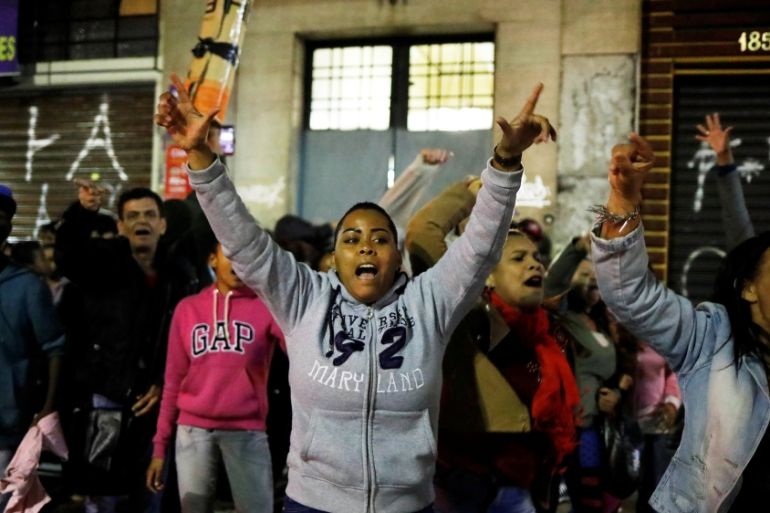Anti-Temer strike paralyses major cities in Brazil
The 24-hour strike against President Temer’s proposed labour reforms turns violent affecting transport in major cities.

Brazilian trade unions have staged nationwide strikes against President Michel Temer’s austerity measures, causing public transport disruptions in major cities across the country and clashes between the police and the protesters.
Unions said Friday’s strike was a success and pointed to adherence by millions of workers in key sectors like automakers, petroleum, schools, post office and even banking. Strikes hit all 26 states and the Federal District.
Keep reading
list of 4 itemsBoeing hit with 32 whistleblower claims, as dead worker’s case reviewed
US imposes new sanctions on Iran after attack on Israel
A flash flood and a quiet sale highlight India’s Sikkim’s hydro problems
“It is important for us to send a message to the government that the country is watching what they are doing, taking away workers’ rights,” said Marco Clemente, head of the 4,000-member radio and TV workers union in Brasilia, leading a picket line outside the headquarters of state broadcaster EBC.
Trade unions and left-wing organisations called for the 24-hour general strike starting from Friday to oppose Temer’s plan to push austerity measures that would weaken labour laws and cut pensions.
On the streets, police clashed with demonstrators in several cities, blocking protesters from entering airports and firing tear gas in efforts to free roadways.
Sao Paulo, Brazil‘s most populous city and financial hub, was worst hit by the strikes.
Police used tear gas to clear highways of protesters, but bus services, the metro and trains all stopped working, bringing the city temporarily to a standstill.
![Buses burn during Friday's demonstrations in Rio de Janeiro [Ricardo Moraes/Reuters]](/wp-content/uploads/2017/04/acbc18793e8b4a028503b3b03beea5cf_18.jpeg)
In Rio de Janeiro, protesters lit fires on a major bridge, torched buses, disrupting commuter traffic, while police used tear gas to force a small crowd of protesters from outside the main bus station.
However, the city appeared to be less affected, with private businesses such as restaurants, cafes and shops opening normally.
In the capital, Brasilia, and in Belo Horizonte, another major city, the metro systems were completely closed down.
Temer criticises strike
Despite the protests, Temer and members of his centre-right government denounced the strike as a failure. The Brazilian president said in an emailed statement that “small groups” had blocked the population from using public transport and said that “work toward the modernisation of national legislation will continue”.
The government argues that economic reforms are needed to pull Latin America‘s biggest economy out of its worst recession on record, cut a huge budget deficit, reduce record unemployment and modernise the economy.
BRAZIL: Just In – Unemployment rate rises to 13.7%. (14.2m unemployed). Unemployment rate more that doubles in past 3 years.
— Gabriel Elizondo (@elizondogabriel) April 28, 2017
The most controversial measure is to raise the retirement age to 65 for men and 62 for women, up from 60 and 55 at present.
The lower house of Congress approved a bill this week to weaken labour laws by relaxing restrictions on outsourcing and temporary contracts, further inflaming union resistance.
The country’s economy shrank 3.8 percent in 2015 and is expected to have contracted a further 3.5 percent in 2016, the most painful recession in a century.
![The unrest comes against amid worsening conditions across Brazil [Ueslei Marcelino/Reuters]](/wp-content/uploads/2017/04/f129c23a928b4b3eb9320ceb259995ce_18.jpeg)
Temer’s reforms have deeply angered many Brazilians and he is weighed down by a 10 percent approval rating for his government.
He took over last year when former President Dilma Rousseff, whom Temer served as vice president, was impeached for breaking budgetary rules. Her supporters denounced the act as a “coup” orchestrated by Temer and his allies in a bid to derail a sweeping corruption investigation.
“This is not a government that was elected with these proposals,” said Bernard Costa, a 27-year-old medical student protesting in Sao Paulo. “These reforms are showing people that this government has is neither legitimate nor representative.”
“Shameless government” read one placard waved by one of a group of protesters who gathered outside Temer’s family home in Sao Paulo.
Nearly one-third of Temer’s ministers and several congressional leaders are under investigation in Brazil’s largest political corruption scheme yet uncovered. It revolves around kickbacks from construction companies in return for winning lucrative projects at state-run oil company Petrobras.
The president himself has been accused of corruption. He has denied any wrongdoing.
|
|